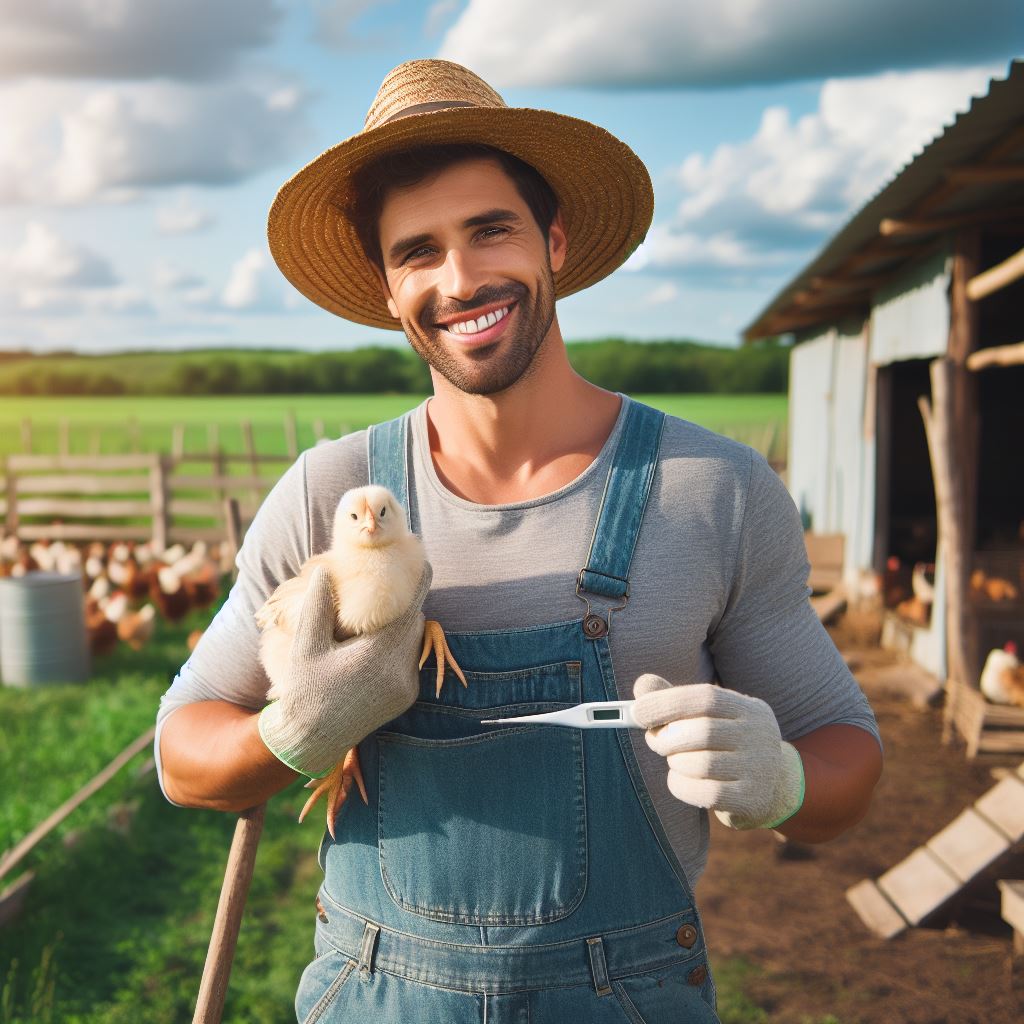Introduction
Poultry health is crucial for the successful raising of chickens, turkeys, ducks, and other birds.
The overall welfare of poultry is directly linked to their health and the prevention of common diseases.
In this blog section, we will explore the importance of poultry health, identify common diseases in poultry, and discuss the purpose of this blog post.
Importance of poultry health
Maintaining the health of poultry is essential to ensure their proper growth, productivity, and overall well-being.
Healthy poultry are more resistant to diseases, resulting in reduced mortality rates and increased profitability for poultry farmers.
Furthermore, healthy birds are less likely to transmit diseases to other poultry or even humans.
Common diseases in poultry
Poultry can be susceptible to various diseases, including respiratory infections, digestive disorders, and viral diseases such as avian influenza.
These diseases can significantly impact the poultry industry, leading to economic losses and affecting food security.
Proper management and preventive measures are crucial to minimize the occurrence and spread of these diseases.
Purpose of the blog post
The purpose of this blog post is to educate poultry farmers and enthusiasts on the importance of poultry health and the preventative measures they can take to safeguard their flocks.
By understanding common diseases in poultry and implementing effective health management practices, farmers can protect their birds and achieve optimal production and profitability.
In the following sections, we will delve into detail about specific diseases, their symptoms, and control measures, providing readers with valuable insights and practical advice for maintaining healthy poultry.
Stay tuned for actionable tips and strategies to prevent and manage common poultry diseases.
Read: https://thefarminginsider.com/bee-hive-genetics/
Understanding Common Poultry Diseases
Definition and Symptoms
Poultry diseases refer to illnesses that affect chickens, ducks, turkeys, and other domesticated birds.
Transform Your Agribusiness
Unlock your farm's potential with expert advice tailored to your needs. Get actionable steps that drive real results.
Get StartedSymptoms may include respiratory issues, decreased appetite, diarrhea, weight loss, and decreased egg production.
Types of diseases
Viral
- Viral diseases in poultry are caused by various viruses and can spread rapidly within a flock.
- Examples include avian influenza, Newcastle disease, and infectious bronchitis.
Bacterial
- Bacterial infections can cause significant damage to poultry health and can be challenging to control.
- Examples include Salmonella, Escherichia coli, and Mycoplasma gallisepticum.
Parasitic
- Parasites infest various parts of a bird’s body, leading to reduced performance and overall health.
- Examples include mites, lice, worms, and coccidia.
Fungal
- Fungi can cause respiratory and digestive issues, as well as skin lesions in poultry.
- Examples include Aspergillus, Candida, and Microsporum.
Impact on flock health and productivity
Common poultry diseases have a detrimental effect on the overall health and productivity of a flock.
They can lead to reduced growth rates, decreased egg production, increased mortality, and significant financial losses.
Infected birds may require extended periods of quarantine, veterinary intervention, and expensive treatments.
Outbreaks of diseases can also negatively impact the reputation of poultry farms and the entire industry.
Moreover, some poultry diseases, such as avian influenza, can pose a risk to human health and cause zoonotic infections.
Generally, understanding common poultry diseases is crucial for poultry farmers to effectively prevent and manage outbreaks.
By recognizing the different types of diseases and their symptoms, farmers can take appropriate measures to protect the health and productivity of their flocks.
Regular veterinary check-ups, biosecurity measures, proper hygiene practices, and vaccination programs are essential in preventing and controlling these diseases.
Maintaining a strong and healthy flock not only ensures farm profitability but also contributes to a safe and reliable supply of poultry products for consumers.
Read: Best Chicken Breeds for Backyard Farms in the US
Preventive Measures for Poultry Diseases
Biosecurity practices play a crucial role in preventing and controlling common poultry diseases.
By following strict biosecurity measures, poultry farmers can reduce the risk of diseases spreading to their flocks.
Biosecurity Practices
Restricting access to the farm
Restricting access to the farm helps prevent the entry of potential disease carriers such as unauthorized personnel, wild birds, and rodents.
Quarantine and isolation
Quarantine and isolation should be practiced for new additions to the flock.
This prevents the introduction and spread of diseases from infected birds to healthy ones.
Sanitation and hygiene
Maintaining proper sanitation and hygiene is essential in preventing the buildup and spread of pathogens.
Regular cleaning and disinfection of coops, equipment, and poultry houses can greatly reduce disease transmission.
Vaccination Programs
Vaccination programs are another crucial aspect of poultry disease prevention.
Vaccines help stimulate the bird’s immune system to produce antibodies against specific diseases.
Importance of vaccines
Vaccines are vital in protecting poultry from infectious diseases by providing them with immunity against prevalent pathogens.
Different types of vaccines are available, including live vaccines, killed vaccines, and subunit vaccines, each specifically targeting different diseases.
Following a vaccination schedule ensures that birds receive the vaccines at the appropriate ages and intervals, maximizing their effectiveness in preventing diseases.
Nutrition and Feed Management
Nutrition and feed management play a significant role in maintaining optimal poultry health and boosting their immune system.
Showcase Your Farming Business
Publish your professional farming services profile on our blog for a one-time fee of $200 and reach a dedicated audience of farmers and agribusiness owners.
Publish Your ProfileProviding a balanced diet rich in essential nutrients helps strengthen the bird’s overall health and resistance to diseases.
Clean water is essential for hydration and proper digestion. Contaminated water sources can introduce pathogens, leading to diseases.
Feed additives, such as probiotics, prebiotics, and immune boosters, can enhance the bird’s immune system and improve their disease resistance.
Stress Management
Stress management is crucial in preventing diseases among poultry.
Minimizing stress factors, such as sudden changes in environment, temperature fluctuations, and excessive noise, helps maintain the bird’s overall well-being and reduces their susceptibility to diseases.
Adequate ventilation and lighting in poultry houses are essential to ensure proper airflow and minimize the risk of respiratory infections.
Reducing overcrowding allows birds to have enough space for movement, reducing aggressive behavior and the spread of diseases.
By implementing these preventive measures, poultry farmers can greatly reduce the risk of common diseases in their flocks, ensuring healthier and more productive poultry production.
Read: Starting a Poultry Farm: Essential Steps & Tips

Early Detection and Treatment
Early detection and timely treatment of poultry diseases are essential to maintaining a healthy flock.
As a poultry owner, it is crucial to be vigilant in monitoring the health of your birds and promptly recognize any signs of illness.
Monitoring flock health
Regular observation plays a vital role in identifying any changes or abnormalities in your poultry flock.
Take the time to observe your birds daily, paying attention to their behavior, appetite, and overall appearance.
Any deviation from their normal behavior should be noted and investigated further.
Additionally, record vital signs such as body temperature and heart rate regularly to establish baseline values for your flock.
Common signs of poultry diseases
Various behavioral changes can indicate that your birds are not feeling well. Lethargy, decreased appetite, increased aggression, or decreased interaction with other birds may all be signs of illness.
Respiratory symptoms like coughing, sneezing, or wheezing should not be taken lightly, as they may suggest respiratory infections.
Furthermore, pay close attention to any digestive issues your birds may be experiencing, such as diarrhea or abnormal droppings, as these might be indicators of underlying health problems.
Consulting a veterinarian
When it comes to the health of your flock, consulting a veterinarian is of utmost importance.
A professional with expertise in poultry health can provide accurate diagnosis and recommend appropriate treatment.
They have access to diagnostic tools and tests, including blood tests or bacterial cultures, which help identify the specific disease affecting your birds.
By seeking professional guidance, you can ensure that your treatment plan is tailored to the specific needs of your flock.
Treatment options
Once a diagnosis is made, your veterinarian will prescribe the most suitable treatment for your poultry.
Medications, such as antibiotics or antivirals, are commonly used to combat various diseases.
However, if you prefer a more natural approach, discuss the possibility of using herbal supplements or homeopathic treatments with your veterinarian.
While these options may not be as extensively studied, they can sometimes provide relief for certain conditions.
Additionally, providing supportive care, such as creating a stress-free environment and ensuring a balanced diet, can greatly aid in the recovery process.
Essentially early detection and prompt treatment are crucial to prevent and manage poultry diseases effectively.
Regular monitoring of flock health, recognizing common signs of illness, consulting a veterinarian, and considering appropriate treatment options are all essential steps in ensuring the well-being of your poultry.
By being proactive and attentive, you can minimize the impact of diseases and maintain a healthy and productive flock.
Read: Robotics in Poultry Farming: The Future Is Here
Conclusion
Recap of important points
In this section, we have discussed the importance of preventing common diseases in poultry health.
We have highlighted several key points to remember.
Firstly, maintaining proper hygiene and cleanliness in the poultry farm is crucial.
Regular cleaning and disinfection of the facilities help prevent the spread of diseases.
Secondly, implementing biosecurity measures can greatly minimize the risk of diseases.
This includes controlling visitors, restricting movement of poultry, and practicing strict isolation procedures.
Thirdly, a balanced and nutritious diet is essential for the overall health and immunity of the poultry.
Providing the right nutrients and supplements helps strengthen their immune system, making them less susceptible to diseases.
Emphasis on proactive measures
Preventing diseases in poultry health requires proactive measures rather than reactive ones.
Showcase Your Farming Business
Publish your professional farming services profile on our blog for a one-time fee of $200 and reach a dedicated audience of farmers and agribusiness owners.
Publish Your ProfileIt is crucial to establish a comprehensive prevention plan that includes regular monitoring, vaccinations, and hygiene practices.
By taking proactive measures, poultry farmers can significantly reduce the risk of diseases, leading to healthier flocks and increased productivity.
Encouragement for poultry farmers to prioritize health
Lastly, we want to encourage all poultry farmers to prioritize the health of their flocks.
Disease prevention should be a top priority as it directly impacts the financial success and sustainability of a poultry operation.
Investing in preventive measures may require additional effort and resources, but it is a wise investment that will pay off in the long run.
By following the guidelines discussed in this blog post and working closely with veterinarians and poultry health experts, poultry farmers can effectively prevent common diseases and ensure the well-being of their flocks.




